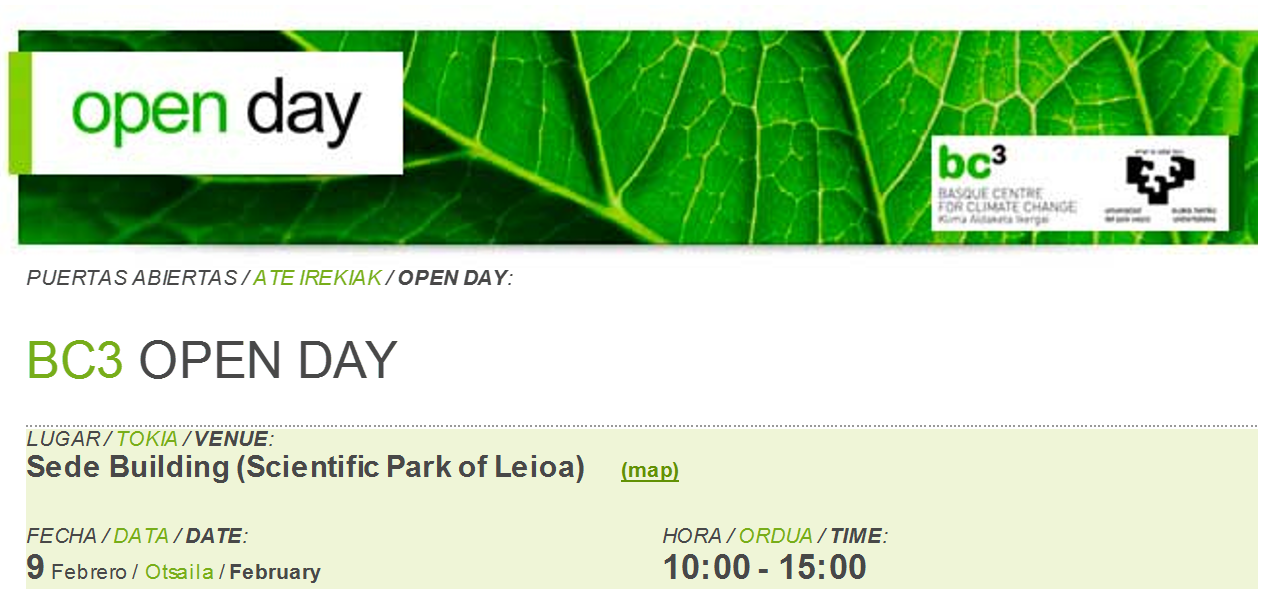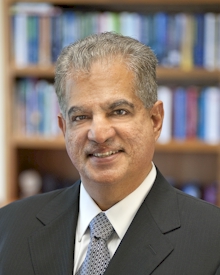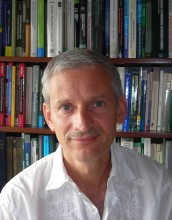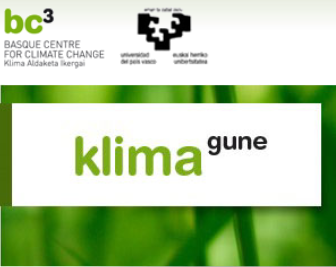BC3 Seminars: Catchment zoning to enhance co-benefits and minimise trade-offs between ecosystem services and biodiversity conservation
BC3-Basque Centre for Climate Change Sede Building 1, 1st floor, Scientific Park of the University of the Basque Country, Leioa, Bizkaia, SpainDr. Virgilio Hermoso and Dr. Simone Langhans.
Integrating ecosystem services (ES) in landscape planning can help identify conservation opportunities by fostering co-benefits between biodiversity conservation and maintenance of regulation and cultural ecosystem services. However, potential trade-offs that arise from accounting for provisioning ES incompatible with biodiversity conservation should be considered. These trade-offs have been, however, overlooked to date, especially in freshwater systems. I will demonstrate how to identify priority areas to enhance co-benefits between conservation of freshwater biodiversity (139 species of freshwater fish, turtles and waterbirds) and two regulation-cultural ES (carbon storage/ flood retention and perennial water availability) while minimising trade-off with two provisioning ES (groundwater provisioning and recreational fisheries) using a catchment in northern Australia as a case study. This novel approach can help address the increasingly complex catchment management challenges arising from increasing demand for provisioning services and diminishing availability of resources, and management and planning challenges in other realms facing similar problems.
BC3 Seminars: “How decision analysis theory can be used for river management”
BC3-Basque Centre for Climate Change Sede Building 1, 1st floor, Scientific Park of the University of the Basque Country, Leioa, Bizkaia, SpainDr. Simone Langhans
Leibniz-Institute of Freshwater Ecology and Inland Fisheries, Berlin, Germany
River assessment and management are challenges to scientists and practitioners alike. Rivers, being highly complex ecosystems, are difficult to characterize with adequate indicators and predicting outcomes of river management actions are, therefore, sophisticated and affected by large uncertainty. Moreover, many stakeholders with potentially diverging interests are involved or affected by river management decisions. Although different approaches to river assessment and management exist, there is a need for a concept that accounts for these difficulties. Decision analysis theory provides appropriate techniques for developing an integral river management concept. In this talk, I will explain the different elements of such a river management concept, i.e. objectives, results of river state assessment, potential management actions, and predictions of system response to management actions, and illustrate the details with different examples from Switzerland and New Zealand.
BC3 Seminars: Species distribution modelling of freshwater organisms
BC3-Basque Centre for Climate Change Sede Building 1, 1st floor, Scientific Park of the University of the Basque Country, Leioa, Bizkaia, SpainDr. Sami Domisch
Leibniz-Institute of Freshwater Ecology and Inland Fisheries, Berlin, Germany
Species occurrence information consists in general of heterogeneous data, ranging from point records that provide accurate information in geographic and environmental space, to coarse expert range maps accounting for dispersal barriers or historical biogeographic limits. Combining both data types in a species distribution model (SDM) framework using newly-developed (1 km) freshwater-specific environmental variables allows to make fine-grain and improved estimates of species distributions. I will demonstrate how the freshwater-specific variables can be easily created for any given region, and present the modelling framework using the North American freshwater fish fauna as a case study. The predictions highlight diversity patterns and hotspots along the stream network, further contributing to the understanding of the current-day environmental factors that shape the distribution of freshwater fish ranges, with the potential in ultimately aiding conservation and management efforts.
BC3 Seminars: Conservation Legacies: Understanding the Social-Ecological Impacts of International Biodiversity Aid
BC3-Basque Centre for Climate Change Sede Building 1, 1st floor, Scientific Park of the University of the Basque Country, Leioa, Bizkaia, SpainDaniel Charles Miller
Assistant Professor at Natural Resources and Environmental Sciences (NRES)
Financial support is critical to achieving global biodiversity conservation goals. However, information about the allocation and the effectiveness of biodiversity aid, the largest source of funding for international conservation, remains lacking. This seminar presents new research on the impacts of international aid for biodiversity conservation in tropical countries. It describes findings from a global study of the effect of conservation funding on threatened species and then focuses on a case study of a conservation aid project implemented in Benin’s W National Park, one the largest protected areas in West Africa. Specially, it examines how the European Union-funded ECOPAS project (Ecosystèmes Protégés en Afrique Soudano-Sahélienne) affected mammal species abundance and the ability of households around the Park to access natural and financial capital. Using a mixed methods approach based on a quasi-experimental research design, the study reports on these impacts and explores the key role of contestation over property rights in shaping them. The presentation concludes by placing findings from the W region in broader international context and by sketching out future research directions
BC3 Open Day
BC3-Basque Centre for Climate Change Sede Building 1, 1st floor, Scientific Park of the University of the Basque Country, Leioa, Bizkaia, SpainBC3, Basque Centre for Climate Change invites you to participate in the "BC3 Open Day" that is to be held on the 9th of February.
BC3 Basque Centre for Climate Change, is a Basque Excellence Research Centre (BERC) created in 2008 jointly by the Basque Government and the University of the Basque Country, that is located since July 2016 in the Scientific Park of Leioa ("Sede" Building).
The objective of this event is to open up the Climate Change Science produced at the center to the University of the Basque Country, with the aim of exploring and promoting potential collaborations among both institutions.
Seminarios BC3/ “Societal and Energy Metabolism as a Tool for Transformation: Understanding the Challenges of Energy-Society Relations”
BC3-Basque Centre for Climate Change Sede Building 1, 1st floor, Scientific Park of the University of the Basque Country, Leioa, Bizkaia, SpainBC3 Seminars
Levels of complexity achieved by societies today have only been possible because of the abundance and readily usable primary energy forms whose exploitation provides huge surpluses of energy flows. However, the bonanza of the past is over and we are facing a global crisis with many challenges to overcome. Socio-economic systems are ever increasingly constrained by biophysical limits, with peaking fossil reserves, decreasing energetic returns and climate change impacts.
Seminarios BC3-UPV/EHU : “Building Organizational Capacity for Sustainable Innovation”, Dr. Sanjay Sharma (Dean and Professor of Management, Grossman School of Business, University of Vermont, USA)
Bizkaia Aretoa Conference Hall Avda Abandoibarra, 3, Bilbao, SpainThis BC3-UPV/EHU Seminar entitled "Building Organizational Capacity for Sustainable Innovation" will be addressed by Prof.Sanjay Sharma, Dean and Professor of Management, Grossman School of Business, University of Vermont and will offer an overview of the phenomenon of organizational sustainability, of major research streams in this domain, and a framework to guide capacity building for sustainable innovation in organizations.
BC3-UPV/EHU Seminars: Groundwater Management in a Food Security Context
BC3-Basque Centre for Climate Change Sede Building 1, 1st floor, Scientific Park of the University of the Basque Country, Leioa, Bizkaia, SpainProf. Jean-Christophe Pereau
University of Bordeaux
This article analyzes the sustainability of market-based instruments such as tradable permits for the management of a renewable aquifer used for irrigated agriculture.
Klimagune Workshop 2017 “Cambio climático y participación”
Bizkaia Aretoa Conference Hall Avda Abandoibarra, 3, Bilbao, SpainKlimagune Workshop, organizado de forma conjunta entre BC3 y la Universidad del País Vasco, se plantea como un foro de encuentro científico innovador que reúna a diversos perfiles relacionados con el cambio climático incluyendo a científicos, gestores a diferentes escalas, empresas privadas, profesionales de la comunicación, organizaciones no gubernamentales sobre medio-ambiente, sociedad y desarrollo, y ciudadanía en general.
BC3 Seminars: Beyond Quantum Biomimetics
BC3-Basque Centre for Climate Change Sede Building 1, 1st floor, Scientific Park of the University of the Basque Country, Leioa, Bizkaia, SpainJavier Martinez
I will divide the presentation in two main parts. The first one is an overview about my work during the PhD along the line of Quantum Biomimetics. This concept, englobes a set of quantum algorithms designed to emulate specific biological properties or processes at a quantum scale. Afterwards, I will cover the main ideas in the field of complex networks, and include a final discussion on the possibility of employing network science to study the dialogue between environmental, social and economical phenomena





